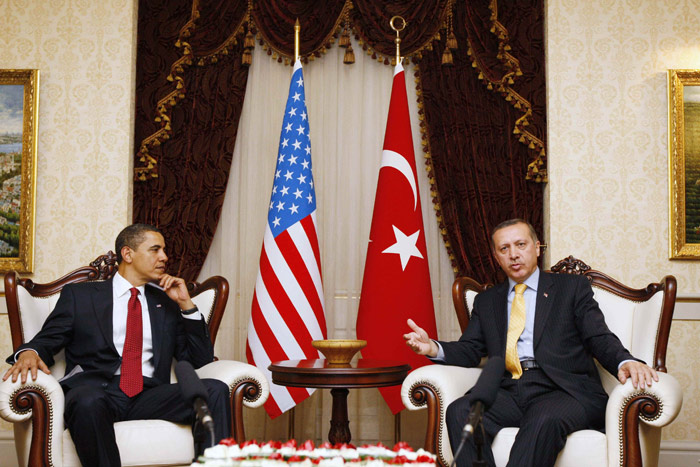Many advisors to the president see Erdogan's government as a possible model for others in the Middle East. But the Turkish premier's feud with Israel and a tendency to make threats are problematic.

Reporting from Washington—
In the space of a few weeks this summer, Turkish Prime Minister Recep Tayyip Erdoganslammed President Obama's approach to Mideast peacemaking, threatened to block U.S. business from drilling for oil and gas in the Mediterranean, and warned he might mobilize Turkish warships to protect activists sailing to Gaza against America's chief regional ally, Israel.Yet when Obama met Erdogan on the sidelines of the United Nations General Assembly meeting last month, he once again gave him more face time than any other world leader. Erdogan, Obama declared as the two headed to a 105-minute meeting, "has shown great leadership."
The attention lavished on the leader of Turkey reflects the importance of the moderate Muslim power to an administration seeking to retain influence in a turbulent part of the world. Many Obama advisors see Erdogan's government, with its pro-business bent and tolerance for secular expression, as a possible model for others in the Middle East. The president has logged more phone calls to Erdogan than to any world leader except British Prime Minister David Cameron.
Yet Erdogan's mercurial temperament and propensity for rhetorical threats makes dealing with him an awkward challenge.
U.S. officials praise Turkey for its help in organizing a new government in Libya, isolating a brutal Syrian regime at war with domestic opponents, and cooperating on a Western missile defense system to contain a potential threat from Iran. But they have been distressed by the way Turkey has recently feuded with Israel, squabbled with neighbors and theEuropean Union, and called out its navy to defend its energy claims in the Mediterranean.
"They've been lighting matches around kindling that is pretty dry," said a U.S. diplomat in the region.
Obama has used virtually every diplomatic tactic available to deal with a partner he considers indispensable but doesn't always understand. He has tried sweeteners, such as drone aircraft to spy on Kurdish militants. And he has resorted to flattery: He phoned Erdogan last year to rave about a Turkish basketball tournament.
But at other times he has felt compelled to be blunt, such as when he complained in a two-hour meeting with Erdogan last year about Turkey's vote against proposed United Nations sanctions on Iran.
Adding to the friction, Turkey's conflict with Israel and other moves have begun to mobilize opposition in the U.S.
A bipartisan group of seven senators, including Charles E. Schumer (D-N.Y.), No. 3 in the Democratic Senate leadership, wrote Obama to demand a U.S. response to Turkish moves that "call into question its commitment to the NATO alliance, threaten regional stability and undermine U.S. interests." U.S. officials have warned the Turks that Congress could try to block access to weapons it badly wants.
Eric Edelman, U.S. ambassador to Turkey from 2003 to 2005, says he has been shocked to see Obama cajoling a nation that has been working against key U.S. diplomatic goals.
Erdogan "gave them a poke in the eye — and he got a [long] meeting," Edelman said.
Erdogan has led Turkey since 2002 as head of the Justice and Development Party, which is rooted in Islam. Backed by a roaring economy, he has set vaulting ambitions to expand Turkey's leadership of the Arab world, and strengthen economic and political ties to the East, even while preserving the nation's valuable security relationship with the U.S.
But these goals often work against one another. Turkey's ties to the U.S. have been strained by its feud with Israel, which has sent the Obama administration into an unsuccessful scramble to make peace between two U.S. allies who used to be friends.
U.S. officials understand that Erdogan remains bitter about Israel's May 2010 commando attack on a flotilla organized by activists in Turkey to bring aid to the Gaza Strip, which is under blockade by Israel. Eight Turks and a Turkish American died in the attack. Erdogan threatened recently to dispatch Turkish warships if Israel threatened any Turkish ships headed to Gaza.
But it is harder for U.S. officials to accept the way Erdogan has escalated his conditions for normalizing relations with Israel, now demanding an end to the blockade of Gaza as well as a formal apology for the deaths of the Turkish citizens. U.S. officials are nervous about what they see as a populist campaign to build an international reputation on the back of anti-Israel rhetoric.
Already considered the most popular politician in the Arab world, Erdogan thrilled crowds last month during a trip to Egypt, Tunisia and Libya when he complained that Israel was "the West's spoiled child."
He campaigned to round up votes in the U.N. Security Council for official recognition of Palestine as a full U.N. member state, a move the U.S. was trying desperately to block. As American diplomats buttonholed officials at the U.N. last month to urge them to vote no, Turkish officials were meeting with some of the same countries nearby to pressure them to do the opposite.
Erdogan made it known that in his meeting with Obama, he told the president that Obama's signature peacemaking initiative had failed, and pointedly read to the president portions of the 2010 speech in which Obama had declared there would be a Palestinian state within a year.

